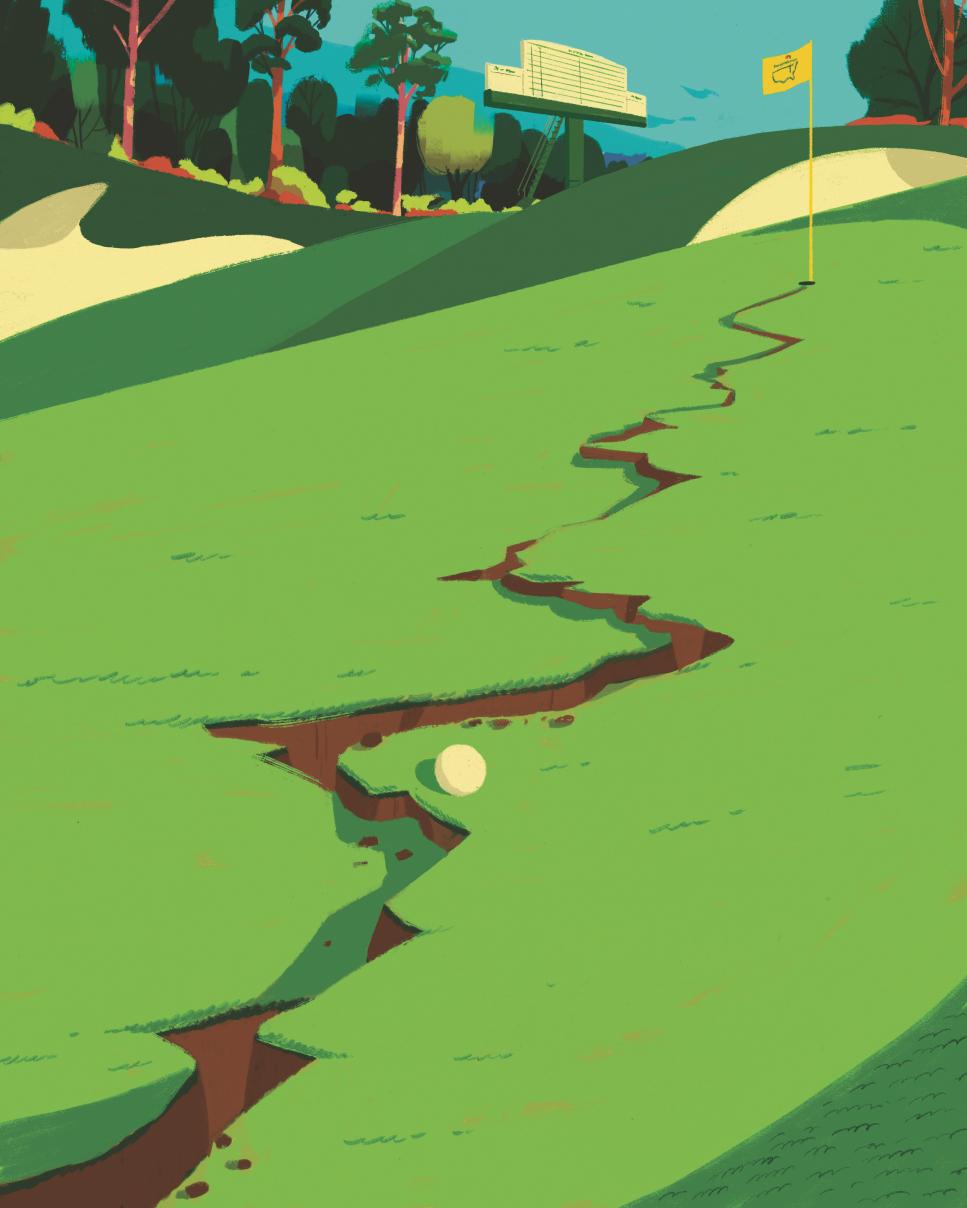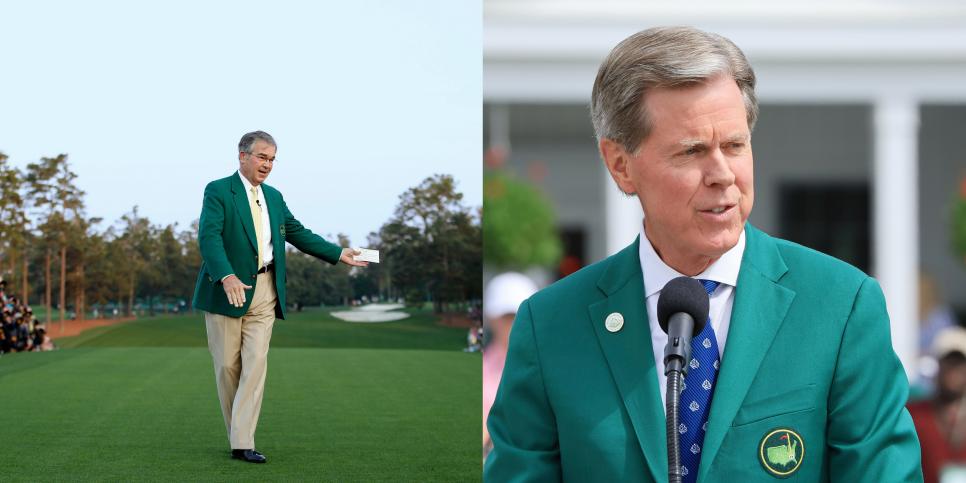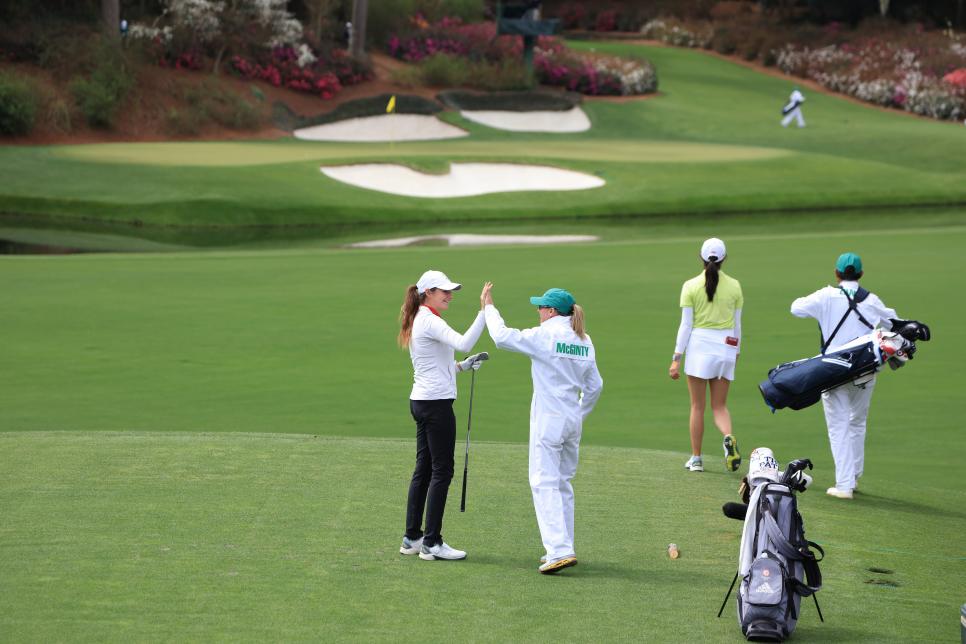Growing Pressure
Masters 2023: Augusta National's expansion debate—a second course, more housing, and even more influence

IT’S KNOWN AS “THE PLAN,” AND IT HAS BEEN PUBLICLY ACKNOWLEDGED. At the 2016 Masters, Billy Payne, then chairman of Augusta National Golf Club, was asked about the club’s development of the western side of the property.
Payne politely laughed off questions about specifics, but he provided insight into the club’s strategy. “Corporately, we plan 20 years down the road,” Payne said. “We have plans for every couple years of iteration going all the way out to 20 years. That, of course, is subject to dramatic change depending on who the chairman is at the time.”
Some changes patrons will encounter at the 2023 Masters were envisioned around the turn of the century. They include a redesigned Par-3 Course for the tournament’s Wednesday contest that will have more patron viewing areas, a new entrance for patrons, a merchandise pavilion that will exit to Washington Road on the east side of the course, two new cabins (one of which is rumored to be a steakhouse for members) and a 40-yard extension of the famed 13th hole. The club plans reach far into the future. Among the rumored ambitions are a banquet hall, on-site housing for all Masters competitors and media, a tournament-only exit off I-20 that goes straight to Augusta National’s parking lot, a reimagined fan village and a new golf course that presumably would host the opening rounds of the Augusta National Women’s Amateur. “Whether or not my 20-year plan would be embraced by the person that follows me is, you know, subject to debate,” Payne said. Yet, for all that Augusta National can plan, there remains plenty it cannot.

LEADING THE WAY Billy Payne (left), Augusta chairman from 2006 to 2017, gave the club an entrepreneurial bent. Current chairman Fred Ridley (right) sees his role as a custodian to the game. Photographs courtesy of Getty Images.
The tournament’s perception as a dependable, unchanging entity in an ever-changing world is one of many reasons the Masters is beloved. However, as much as Augusta National honors the past, the club has been mindful of the future. The Masters was the first 72-hole tournament to be played across four days; the first tournament to use leader boards and the over/under-par scoring system; the first to introduce grandstands and gallery ropes; the first to be broadcast on radio, in color on television, in 3-D and streamed to let fans see every shot hit on every hole. What the club hasn’t introduced it has improved, from efforts as advanced as the agronomic methods and subterranean turf-conditioning system needed to keep the course in pristine shape to notions as elementary as concession efficiency. Everything related to the Masters experience is excellence personified.
However, excellence must be defended, and growing pressures warrant consideration. How the game is played has been transformed by equipment advancements. The LIV controversy, which has ripped the professional game apart, has dragged the club into a lawsuit backed by Saudi Arabia’s wealth fund and entangled the club in an antitrust probe from the Department of Justice. Augusta’s standard of excellence presents challenges when considering its direction. Does Augusta National run the Masters or vice versa? Aggressive expansion in influence and physical footprint has transformed Augusta National from a club that hosts a tournament into a club whose actions and direction matter well beyond four days in April. Some pressing questions need to be answered to maintain this station and continue the club’s trajectory.
IN 2016, PAYNE’S ANSWER WAS IN response to a question about the club’s acquisition of an entire neighborhood obtained plot by plot over the course of 30 years, ultimately turning that neighborhood into a parking lot. Yes, the club bought an entire neighborhood that, currently, is used for parking one week of the year. However, multiple members and former workers at the club suggest the plan spans more than 20 years. “It’s closer to 30, 40 years down the road,” says one member, who has been with the club for more than two decades. Another person familiar with the club’s business dealings clarified that the plan has no end point; rather, it is constantly augmented and rolls on.
Much of the plan’s reach is tied to the club’s land acquisition. How much land the club has acquired and how much money it has allocated are a bit of a mystery because the club obscures these dealings using limited-liability companies rather than the club proper. A Wall Street Journal report in 2019 estimated the club spent more than $200 million during the previous 20 years buying up neighboring land, but this figure, multiple longtime members say, remains well short of the true number. What’s the real figure? “Whatever you want to guess, it’s going to be wrong,” another veteran member says.
In recent years these purchases have become more public, with most of the reported procurements being businesses on Washington Road, the four-lane highway that runs past the front gates. (The club acquired a 15-acre shopping center across the street for $26 million and a former Wendy’s by the intersection of Washington and Berckmans for $3.4 million.) Members say remaining areas of pursuit include property near I-20, more plots on Washington Road, land south of the Berckmans Road lot and a neighborhood east of the Par-3 Course. What’s fueling these purchases and their development harkens to Payne’s comment about improving the tournament. It also suggests Augusta National makes a lot of money through the Masters and doesn’t know what to do with it. By reinvesting that capital, the club limits taxes on its fortune.
Each improvement and addition has been met with almost consensus approval by the public. However, some members worry that the changes have no end in sight. Eventually so much will change that what is already loved will be unrecognizable. “So far, it hasn’t happened,” says one longtime member. “With every new project that agita is there. No one bats a thousand.”
The person who gave the plan a more enterprising lean—and who arguably had the biggest impact on the club since founders Bobby Jones and Cliff Roberts—was Payne. A former football player at the University of Georgia, Payne rose to prominence as an advocate for bringing the Summer Olympics to Atlanta. He succeeded, an achievement that led the Atlanta Journal-Constitution to dub Payne a “folk hero” in the Peach State. A decade later, Payne was named the sixth chairman of Augusta National, after Hootie Johnson, a man whose progressive business legacy was marred by his complicated response to cries for the club to allow female members. Controversy aside, Payne inherited a comfortable position.
Payne was like a politician, front and center and involved in everything he could be. He had pride in who he represented and used any platform he could to spread that esteem. Payne saw the Masters for what it was and could be. “Before Billy, when you were invited into Augusta National [as a member], you felt like you made it,” one former USGA executive with ties to the club says. “Billy turned that feeling from an accomplishment into a galvanizing force. Billy didn’t care about finish lines. He wanted you to be excited about the next race.”
Payne was a real estate lawyer, and though land acquisitions were well underway when he took over, he sent the efforts into overdrive, believing what the club could achieve was limited only by the property at its disposal. He was a leader who was a commanding presence and astute tactician, and his reign coincided when golf’s other families—the USGA, PGA of America, PGA Tour and R&A—lost the veneers of their power because of public missteps or were led by individuals lacking Payne’s magnetic personality. Rather than isolation from these bodies, Payne worked to build relationships with them, which proved to be a catalyst for grow-the-game initiatives like the Drive, Chip and Putt and amateur championships in Asia and Latin America. Payne was socially conscious and understood the need to modernize the club, bringing in women as members to end almost a century of discrimination. Said one former PGA of America executive, “Payne wanted what was best for his club, but that didn’t have to be mutually exclusive of what was good for the sport.”
Payne was also a businessman, and one of the lessons he learned from his Olympic experience, multiple people who worked with Payne say, concerned the over-commercialization of the event. Payne was aghast at the volume of peddlers not associated with the city or the games that descended on the South, feeling they were not only diminishing the reputation of the Olympics but making money off the work of others. “Billy saw himself as a civil servant,” a member says, referring to Payne’s Olympic duties. “He wanted to show the world the best of Atlanta. He wasn’t naive to the commerce, retail and the like that would follow. He knew what it could do for the economy, but to Billy there was a right way and wrong way to do business. He couldn’t stand the amount of hucksters and that he was powerless to stop them.”
This is how the club had come to view what happened outside its walls during Masters week, including the secondary ticket market charging exponentially higher rates for Masters badges than prices the club issued them for, home owners renting out their residences for tens of thousands of dollars for the week and charging hundreds for cars to park on their lawns and pop-up stores hawking knockoff memorabilia on Washington Road. Payne saw these endeavors as barnacles and was adamant about ridding them from the club’s underside. This thinking led to expansion plans like a new highway exit that would keep patrons away from the street market. Fans should not have to pay more for parking on top of their badge entrance, so let’s build a new parking lot. The more spots the club owns on Washington Road, the fewer spots that can serve as swap meets. New technology now ensures badge holders caught reselling passes will have future privileges revoked.
Payne brought the club into the 21st century and made the Masters as profitable as ever. “It was hard to argue the club was doing anything wrong in its business ventures because it was making so much money,” a former club employee familiar with Augusta National’s finances says. “Payne looked at what was coming in as only a fraction of what was possible.” The revamped and expanded merchandise centers were Payne-led efforts that had immediate financial benefits, with the media deals growing exponentially.
Payne is still highly respected by Augusta National members, but some in the golf industry believed Payne became too visible. This opinion could derive from jealousy, but it existed. “We govern 20 million golfers and 14 national championships,” says a USGA executive. “The PGA of America answers to 30,000 club pros. The tour runs the biggest professional league in the sport. [Payne] had a few hundred members and the Masters. He’s a good man and intelligent, but he’s coming at the game from a very different viewpoint than the rest of us.”
AMONG THE RUMORED AMBITIONS ARE A BANQUET HALL, ON-SITE HOUSING FOR ALL MASTERS COMPETITORS AND MEDIA, A TOURNAMENT-ONLY EXIT OFF I-20 THAT GOES STRAIGHT TO AUGUSTA NATIONAL’S PARKING LOT, A REIMAGINED FAN VILLAGE AND A NEW GOLF COURSE.
When it came time for Payne to step down, Fred Ridley was praised as his replacement. Ridley won the 1975 U.S. Amateur and competed in the 1977 Walker Cup but spurned the enchantments of professional golf to go into law. He remains the last U.S. Amateur champion not to turn professional. Ridley’s professional background is in commercial real estate, and he also served as USGA president in the mid-2000s. Two-time Masters champion Ben Crenshaw called Ridley the “consummate gentleman,” which is about the highest compliment an Augusta member can receive.
Those with ties to Ridley—at Augusta and during his time with the USGA—say Ridley saw the chairmanship as a custodian role to the game and to the club. “[Being USGA president] is largely ceremonial,” a former USGA executive says. “Ridley actually gave a damn.”
Payne had left the club in good hands, and its plans remained ambitious; Ridley’s job was to keep it humming. In terms of the club’s position among the five families, Ridley envisioned himself as a supporting character, wanting to help restore the USGA’s image after a decade of blunders and provide whatever help he could to new PGA Tour commissioner Jay Monahan, those familiar with Ridley say. “Fred saw the tour, the PGA, the USGA as the groups that play a daily role in the lives of American golfers,” an Augusta National member says. “He wanted the club to do what it could to help, and when it was our week, to deliver the best we can.”

The Augusta National Women’s Amateur was Fred Ridley's idea and one of the club's more radical changes in its history.
David Cannon
Ridley’s accomplishments cannot be downplayed; the Augusta National Women’s Amateur was his idea and one of the more radical changes the club had made in its history. He has also been instrumental in the club’s community outreach. “This is a national club. Most members have their own hometowns, and Augusta can be forgotten,” one longtime member says. “[Augusta] can be taken for granted. [The townspeople] are good neighbors, and Ridley wants to make sure [the club’s] relationship is more than just transactional with the town.” But after a decade of Payne singing the club’s praises, Ridley believed it was time to slightly lower the volume. For the first years of his tenure, that’s how he proceeded.
Then the pandemic hit. Professional golf was the first major sport in the United States to return to action after the outbreak of COVID-19, with golf’s families coming together and working cohesively. Monahan was widely credited for leading the charge, and his will and collaboration were paramount to what the sport achieved. However, as multiple sources with knowledge of those discussions later relayed, it was Ridley who got the other American entities—specifically the USGA and PGA of America—to go along. As one source inside the PGA Tour says, “Jay saw himself as a quarterback. Fred was the team-appointed captain.”
Already admired, Ridley became revered and seen as a voice of reason among his peers. His importance grew with the advent of LIV Golf. Some may debate what responsibility lies with the PGA Tour in allowing the Saudi-backed circuit to manifest, but no doubt the PGA Tour is heavily beholden to Augusta National and the Masters to ultimately win this fight. If LIV golfers are allowed to compete in future majors, the tour loses significant leverage to retain players. Though Augusta National is not changing its criteria for 2023, Ridley was blunt when stating his views on LIV. “Regrettably, recent actions have divided men’s professional golf by diminishing the virtues of the game and the meaningful legacies of those who built it,” Ridley said in December 2022. Sources close to Augusta National and the PGA Tour say the club is weighing how it will treat LIV players for 2024 and beyond, and the answer could be coming soon. Said Ridley, “As we have said in the past, we look at every aspect of the tournament each year, and any modifications or changes to invitation criteria for future tournaments will be announced in April.”
Ridley may have wanted a supporting role, but his chairmanship is now arguably more important than ever. With that power comes responsibility and possible repercussions. In trying to do what’s best for the tournament and for the game, Ridley may have opened the club to scrutiny. Ridley was named in LIV Golf’s antitrust lawsuit against the PGA Tour in August 2022. The lawsuit alleges Ridley and the club conspired with the tour against LIV. “For example, in February 2022 Augusta National representatives threatened to disinvite players from the Masters if they joined LIV Golf,” reads one allegation. Another says club officials attended a PGA Tour council meeting and contended that Augusta National was working with the tour to “address” LIV. The claim goes further with this reference to behind-the-scenes work from Ridley: “Augusta National Chairman Fred Ridley personally instructed a number of participants in the 2022 Masters not to play in the LIV Golf Invitational Series.” The lawsuit also mentions that Phil Mickelson’s suspension from the PGA Tour came the day after Mickelson’s name was removed from the 2022 Masters field.
Ridley and the club are also part of the Department of Justice’s antitrust probe in professional golf. It should be noted Ridley is not the only target; filings by LIV in January 2023 accuse Augusta members Condoleezza Rice and Warren Stephens of attempting to persuade the DOJ not to investigate the club. Three members within the club, along with senior executives at the PGA of America and USGA (who are also subjects of the investigation), insist the matter is more procedural than it is being portrayed in the press. Still, it is happening, and a club that values its privacy doesn’t particularly enjoy the optics of a probe.
DOES AUGUSTA NATIONAL RUN THE MASTERS OR VICE VERSA? AGGRESSIVE EXPANSION IN INFLUENCE AND PHYSICAL FOOTPRINT HAS TRANSFORMED AUGUSTA NATIONAL INTO A CLUB WHOSE ACTIONS AND DIRECTION MATTER WELL BEYOND FOUR DAYS IN APRIL.
Those associated with the club insist Ridley has the backing of membership and that Ridley’s even temper and gentle touch are needed in this emotional, litigious, existential clash. “The rah-rah guys are good in the movies, not real life,” says one member with a considerable voice inside the club. “Fred is not going to grandstand. Fred’s too smart to go down that path.” However, many Augusta National members are leaders of companies with dealings in Saudi Arabia. They might not personally like what LIV is doing—and abhor LIV turning the coming Masters into a spectacle—but they also have to answer to their businesses and boards. Another view is that professional golf’s civil war is a potential opportunity for the Masters to strengthen its importance. “If other [stars] go to LIV, and the tour is firm in its suspensions, [the Masters] and other majors would be one of the only places for men’s golf to be united,” says a member with ties to another governing body.
EXPANSION AND LIV BATTLES HAVE opened a window into the costs that come with great ambition. Take the lengthening of the 13th. The exact number is not known, but those associated with the club say it spent $20 million to acquire the land from Augusta Country Club. That’s $20 million for an extra 40 yards used only four times a year. Changes to the course are made yearly, and most aren’t announced, but changing the most iconic par 5 in golf is different. Some believe the changes were made to restore the hole’s integrity. Others believe it’s the club’s not-so-subtle message to the R&A and USGA that arguably the most famous hole in golf has to be saved because the governing bodies haven’t done their job in curbing distance. “You ask different members, you’ll get different answers. A shot fired about distance is a recurring answer,” one member says. “It will be interesting to see what the official line about it is because people are wondering.”
Who gets to enjoy the Masters is another subject of gravity. For years the tournament eschewed the corporate onslaught of premium seats and company suites and other trappings of modern sports entertainment. That mind-set has changed, encapsulated by the opening of the ultra-exclusive Berckmans Place retreat. Like most things Masters related, Berckmans is a unique experience and redefines luxury hospitality, boasting replica putting greens and high-end food-and-beverage offerings.
Despite measures to cut down on secondary markets, badges still wind up on ticket hubs at five-figure prices. “The patrons are the most informed, passionate galleries in golf because we have the most passionate base,” a member says. “The more you bring in corporate crowds, the more badges that are turned around and sold for profit, the more that passionate base can get pushed aside. It hasn’t yet, but you have to be careful.”
Because of unending development some worry change is not just warranted but expected, and those expectations must meet an insanely high standard. That is a recurring concern among members when talks arise of a second course. “It would be the most anticipated course ever. How do you build something that lives up to that?” a source with ties to the club says. Then there’s the question of how the course would be used. The de facto response is the course would be for the ANWA, a nod to the founders’ aspirations for a women’s course at Augusta National before the Great Depression derailed them. However, does the club use a second course to expand its grow-the-game initiatives and—hold your breath—open it for limited public play? If it goes that route, how can it avoid becoming a tourist site, something the club has zero appetite for? “If you do this, you have to do it right,” says a former employee with a decade of service. “The problem is that a lot of people have different ideas of what ‘right’ is.”
In the face of these modern challenges a new generation of members wonders how the club can be subservient to the past and adhere to the present. These members see the future changes as a chance to shape history. They hear the reservations about catering to VIPs and ask you to point to another major sporting entity that doesn’t. They note what Payne and Ridley have done and believe a sport in which Augusta has a larger role is a sport that’s better off.
When one new-ish member is asked why some members have reservations about Augusta’s future initiatives, he responds, “The biggest mistake we make is painting those who resist change as stubborn. That’s not true,” the member says. “Their opinions come from care. They believe they are protecting a vulnerable asset, and without them, the world would carelessly fumble a beautiful thing.” Often, he says, what is perceived as bold today will seem logical tomorrow. “If anything, that’s what this club is about, trailblazing,” he says. “It wouldn’t follow the club’s pattern of behavior to stop where we’re at.”
Though some Augusta National members are uneasy with the battles the club must fight, they almost unanimously say they don’t see how the club can retreat. Despite a crossover of Augusta membership with the USGA, there is a fear that the governing body is incapable of taking a step forward without stepping on its own feet. The PGA Tour is battling for its existence against an entity that has the means to sustain a fight with no end. A sense of duty has always been instilled when becoming a member at Augusta National. Payne intensified that responsibility, and Ridley has carried it forward. Where the members carry it from here is now the question.



